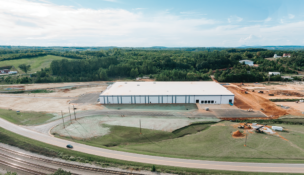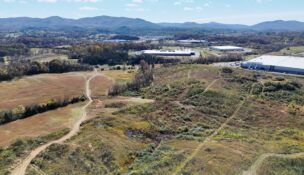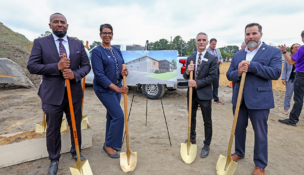Virginia ranks 3rd in CNBC’s Top States for Business
North Carolina bumps Va. from No. 1 after two years at top
Virginia ranks 3rd in CNBC’s Top States for Business
North Carolina bumps Va. from No. 1 after two years at top
After two consecutive years at the top, Virginia slipped to third place in CNBC‘s 2022 America’s Top States for Business rankings, the business news channel announced Wednesday morning. North Carolina achieved the coveted No. 1 ranking this year.
“A great education system is building a smart workforce,” CNBC said about Virginia this year. “But migration has slowed to a state where living costs are high.”
In 2021, Virginia took the top spot in the annual rankings of business-friendly states for a second, consecutive time. Virginia also won in 2019, 2011, 2009 and 2007. CNBC did not rank the states in 2020 due to the COVID-19 pandemic.
In announcing North Carolina’s win this year, CNBC praised North Carolina, saying, “Political leaders in the Tar Heel State keep managing to put partisanship aside to build the nation’s strongest economy.” North Carolina, which ranked second last year, also had some major economic development wins this year, including the $2 billion VinFast electric vehicle factory announcement in March. Apple announced last year that it will locate its East Coast hub in North Carolina’s Research Triangle region.
Speaking on CNBC’s “Squawk Box” Wednesday, North Carolina Gov. Roy Cooper said, “We’ve pulled together in a bipartisan way to make sure that businesses know that we’ve got the most talented, educated workforce in the country.”
Washington state ranked second in this year’s Top State rankings, with Colorado coming in fourth and Texas fifth.
During his run for office last year, Republican Virginia Gov. Glenn Youngkin downplayed the state’s two-year top ranking under his Democratic predecessor, Gov. Ralph Northam, telling Virginia Business, “I am thrilled to death that Virginia gets accolades. I am a proud, proud Virginian, and I want Virginia to get accolades. Unfortunately, Virginia isn’t performing like the No. 1 state to do business in. It’s not. In fact, some of the underpinnings to that ranking actually shine a bright light on the challenge as why we’re not performing. The cost of living in Virginia — gosh, we’re ranked 32nd, and the cost of doing business, where we’re ranked 26th, and the quality of our infrastructure, where we’re ranked 24th.”
In a statement Wednesday, a Youngkin spokesperson said, “Like the governor said last year, being acknowledged as a top state to do business is great for the commonwealth, but accolades and rankings haven’t always translated into growth in Virginia.” The statement also said that he is committed to lowering the cost of living and making Virginia more competitive.
One of Youngkin’s main priorities as governor is to get more large plots of industrial-zoned land “shovel-ready” to be able to better compete with other states for large projects, a need cited by economic developers statewide. “I recommended that we include up to $200 million out of the American Rescue Plan money to be put forth to site readiness across Virginia so that companies can move here,” he said last year before the election.
He also pointed Wednesday to some positives since he took office in January, including major economic development announcements and the expected addition of 80,000 more jobs promised by companies expanding and coming to Virginia.
The state has seen some big development news this year, with aerospace and defense contractors Raytheon Technologies Corp. and The Boeing Co. moving their global headquarters to Arlington. Additionally, the Lego Group said in June that it will be bringing a $1 billion toy manufacturing plant to Chesterfield County. But economic development wins are just one component of an array of considerations that go into the Top States list.
Virginia might not be No. 1 in CNBC rankings but can still be competitive, Virginia Chamber of Commerce President and CEO Barry DuVal said in a statement: “The state remains a favored location for business and has made great strides over the past few years to restore our competitive position. … Unfortunately, the cost of doing business continues to rise in the commonwealth, making it harder to compete against other states which have aggressively cut taxes and streamlined regulations.”
CNBC based this year’s rankings on 88 metrics — up from 85 last year — across 10 categories: workforce; infrastructure; cost of doing business; economy; life, health and inclusion; technology and innovation; business friendliness; education; access to capital; and cost of living. Workforce is the most heavily weighted category and considers a state’s concentration of science, technology, engineering and math (STEM) workers, the percentage of workers with college degrees, and new this year, workers with associate degrees and industry-recognized certificates.
Virginia ranked No. 11 in workforce this year, down from No. 3 last year, but retained its No. 2 rank in education, which considers the number of colleges and universities in each state, including historically Black colleges and universities (HBCUs).
Youngkin has been critical of the running of the Virginia Community College System, which is viewed as the state’s biggest pipeline for future specialized workers in tech, manufacturing, wind energy and other industries. Enrollment, already falling at many community colleges, declined significantly during the pandemic — a harbinger of skilled jobs continuing to go unfilled.
The governor, saying he wants the 23-college system to do better, has used his bully pulpit to influence the hiring of the next chancellor. At the end of June, longtime VCCS Chancellor Glenn DuBois retired, and a previously hired candidate withdrew amid the controversy surrounding the job.
In June, the VCCS board, which hires the chancellor, agreed to allow a member of Youngkin’s administration to be a nonvoting member of its search committee.
Virginia jumped up in the infrastructure category ranking, from 24th last year to ninth this year. For this category, CNBC measures the value and volumes of goods shipped by air, waterways, roads and rail. In April, Stephen Edwards, CEO and executive director of the Virginia Port Authority, said that the port had grown about 25% in container volume it had moved in calendar year 2021 vs. 2020 and had about $1.3 billion in investments. Other metrics include the condition of highways and bridges, commute time, broadband access, utility infrastructure and available office, industrial and vacant space.
Virginia performed its worst in the cost of living category, which is weighted the lowest. The commonwealth rose from 32nd last year to No. 30 this year.
North Carolina received 1,580 out of 2,500 points. Virginia received 1,553 points.
T

















